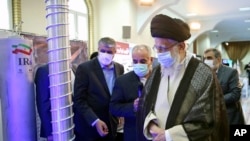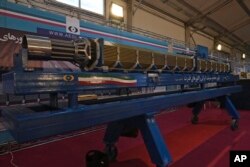U.S. intelligence officials involved with closely monitoring Iran's rapidly expanding nuclear program assess that Tehran continues to stop short of producing nuclear weapons, though they caution there are still reasons for concern.
The conclusions, part of an unclassified report released Monday by the Office of the Director of National Intelligence, are in line with recent public statements by top U.S. intelligence and military officials — all of whom warned it will not take long for Iran's nuclear program to weaponize if such a decision is made.
"Iran is not currently undertaking the key nuclear weapons-development activities that would be necessary to produce a testable nuclear device," the ODNI report said.
But it also noted Iran "has accelerated the expansion of its nuclear program … and undertaken research and development activities that would bring it closer to producing the fissile material needed for completing a nuclear device following a decision to do so."
The report further warns Iran continues to grow the size and the enrichment levels of its uranium stockpile beyond what was allowed under the now-defunct Joint Comprehensive Plan of Action (JCPOA), and that Tehran's research and development of advanced centrifuge technology also exceeds what was allowed under the nuclear deal.
The United States, under President Joe Biden, has been working to try to revive the 2015 JCPOA, which was scrapped by former President Donald Trump in 2018.
According to Iranian and Western officials, Washington and Tehran have engaged in a series of indirect talks over the past several months, though there are few indications much progress has been made.
"There is no agreement in the offing, even as we continue to be willing to explore diplomatic paths," U.S. Secretary of State Antony Blinken said during an appearance at the Council on Foreign Relations in New York last month.
This past May, the most senior U.S. military official warned U.S. lawmakers that Iran's nuclear activities bear watching.
"They continue to improve their capability," said General Mark Milley, chairman of the Joint Chiefs of Staff. "[Tehran] could produce enough fissile material for a nuclear weapon in less than two weeks from time of decision and would only take several more months to produce an actual nuclear weapon."
The head of the U.S. spy agency voiced similar concerns in April.
Iran could "probably develop that stockpile of weapons-grade enriched uranium in a couple of weeks," CIA Director William Burns told an audience in Texas, adding, "Our judgment is that the Iranian leadership has not yet made a decision to resume the weaponization program."
Burns also warned at the time about Iran's progress on delivery systems for a potential nuclear weapon, something echoed in the latest ODNI assessment.
"Iran has emphasized improving the accuracy, lethality, and reliability of its missiles," the report stated. "Iran's work on space launch vehicles [SLVs] — including its Simorgh — shortens the timeline to an ICBM [intercontinental ballistic missile] if it decided to develop one because SLVs and ICBMs use similar technologies."







